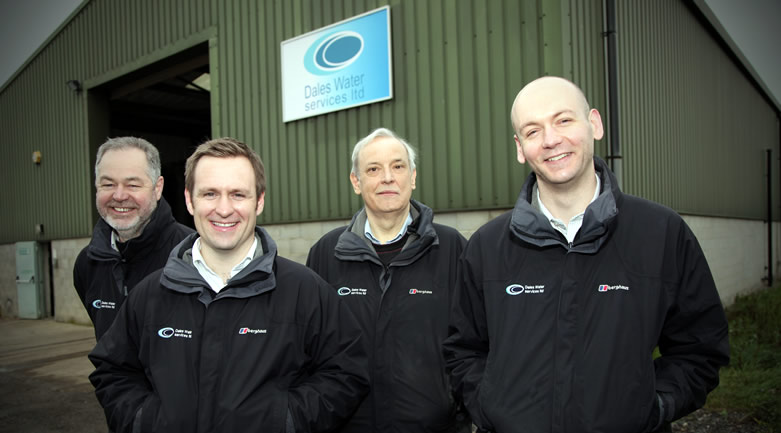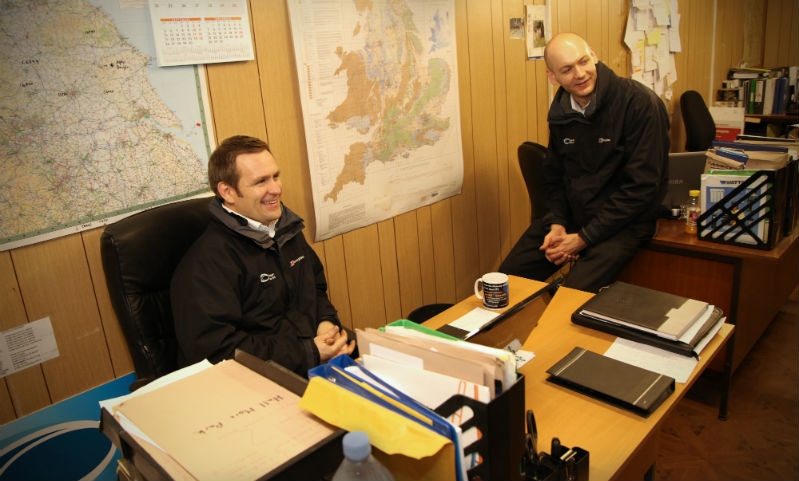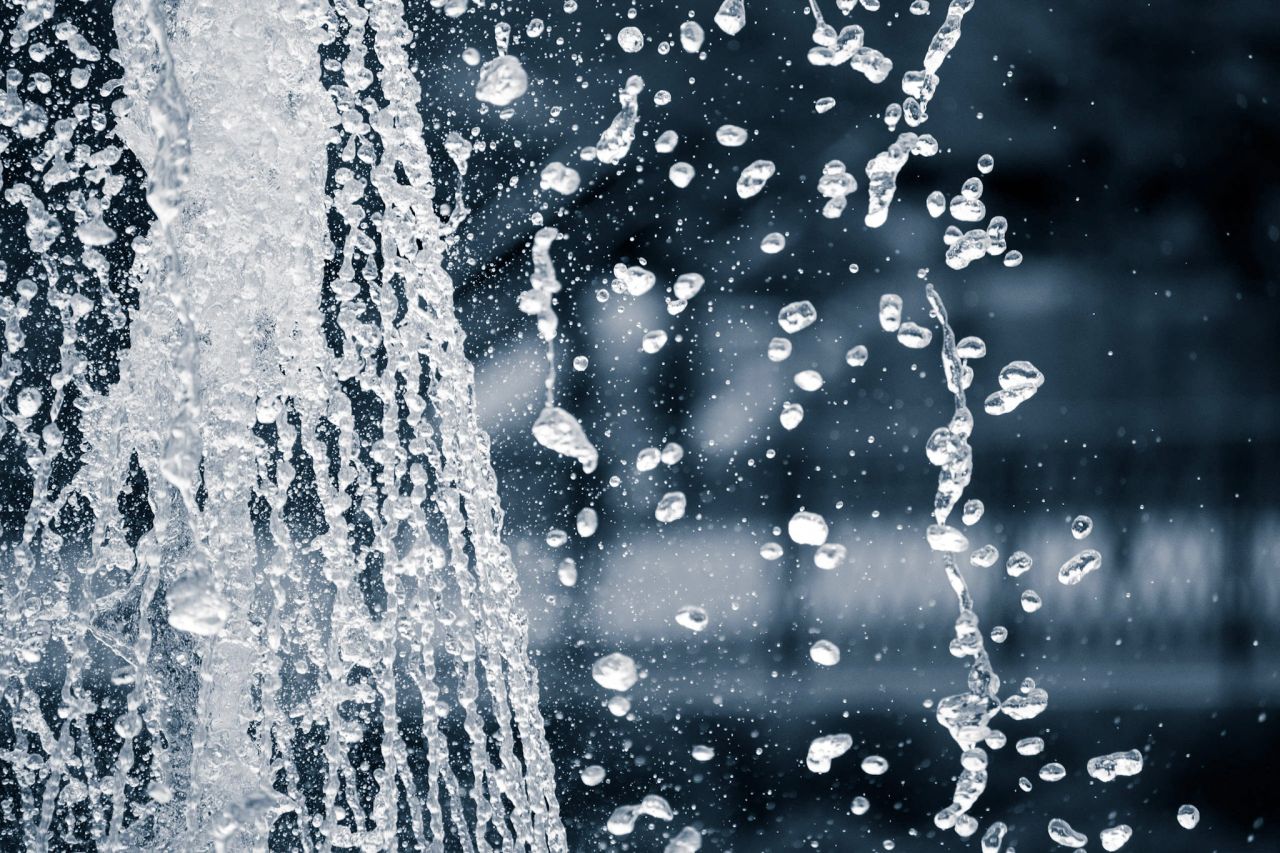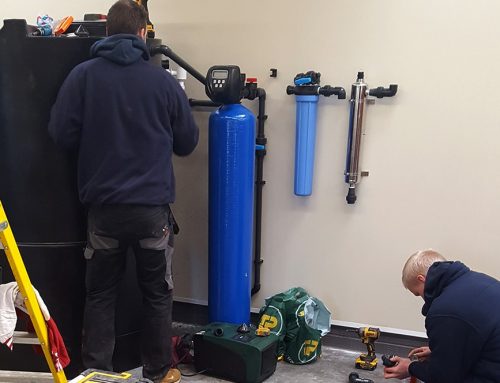Last year we worked with the Water Well Journal to produce an article that looked at the groundwater industry here in the UK and compared it with that of the United States. The article was written from the view point of both a veteran water well contractor and a professional who has been in the industry shorter amount of time.
Two of our directors, Chris Dodds and Jonathan Dalton stepped up to the plate to answer the questions. We posted Chris’s interview last year and below you can read part 2 with Jonny’s answers.
About Jonathan Dalton

The Dales Water Directors, Jonathan Dalton, Far Right
2nd generation of one of the founding directors ‘Jonny’ has approximately 12 years in the groundwater industry in various guises. Jonny worked in the Groundwater and Contaminated Land unit of the Environment Agency dealing with both regulation of groundwater abstraction licenses, then became a senior Geo-environmental Scientist for a large consulting engineers before moving on to become a director at Dales Water full time in 2009. Jonny has been involved in large water well supply projects for both sports clubs and water bottling facilities but delivers on projects of all sizes.
1. How do you see the groundwater market today?
We are busy, that’s a good thing given the local and global financial situation that we have seen over the last few years. The financial situation is obviously worrying but our market seems to be pretty solid so far. There is always the pressure to control cost and deliver new business but things do seem to be positive if you work hard and deliver.
2. Where do you see the market going in the coming years?
The focus is on the Environment, saving money and ground source heating. The groundwater water well industry is part of the renewable market and as such can tap into the wealth of requirement for people to want to be green and companies needing to be seen to be green. Water not having to travel hundreds of miles to supply is part of this. With reference to the financial crisis there is also an increased interest in saving money which water wells can do quickly, delivering back capital expenditure and saving clients’ money long term. Finally, in recent years we have seen an increased interest in ground source heating drilling which is definitely a growth area being directly linked to both being ‘green’ and saving money.
3. What is critical to the success of your company in the future?
Where do I start? Firstly hard work but that goes without saying. Investing in the correct staff in terms of employment, training and education will enable us to deliver on projects to the highest standards, and win repeat business as so much of our work comes through word of mouth.
Investing in the best technology that we can is also critically important. It enables us to deliver work quickly, efficiently, safely and with minimal hassle so that we can maximize the profit margin, re-invest again and deliver on other sites with the same number of staff.
4. What are the main groundwater quality issues you’re seeing at jobs sites today?
There are various groundwater quality issues that we are seeing. The very common ones are things like Iron and Manganese, very common determinants that are elevated in groundwater but for which good, well established treatment procedures are in place for and regimes for servicing and maintenance can be created to accommodate.
We are struggling to find effective treatment for some determinants that can occur in groundwater; these are normally unexpected and occur despite hydrogeological reviews. Determinants such as Sulphate come to mind for which no cost effective treatment exists other than reverse osmosis which can be expensive and leave water ‘lifeless’.
In the future we are concerned about the lack of control over closed loop ground source heating boreholes mixing aquifers without consideration or regulation.
5. What has been the most challenging thing to learn or get accustomed to as a groundwater contractor?
‘Old school’ habits and practices and breaking away from them. Drilling for water wells has been around a long time that means that there is a vast pool of experience available from which to draw but it also means that that bad habits and practices have been picked up along the way which do not comply with modern day requirements and techniques. This is definitely something that I am not accustomed to but also I am not willing to learn as we strive to be the best in our industry and deliver to highest standards. This includes meeting modern day requirements for health and safety and standards of workmanship. We need to take the best part but leave the worst of the ‘old school’ thinking behind.
6. What do you think could be biggest difference in the water well industry 20 years from now?
Technology is moving fast, we are already using modern systems of work, communication and machinery to save on labour, time and associated costs and things are definitely going to accelerate further in this way. We are using telemetry systems with water level loggers to remotely monitor groundwater levels. We are already using ‘Apps’ on mobile phones to help us deliver our work and monitor things such as noise levels of machinery. We are using the internet to share work.
All these elements will no doubt combine and move on further so that we can do more remotely, ‘talk to’ and control our drilling rigs, resetting filter control valves using our phones or diagnosing breakdowns via communication with a tablet computer.
There will always be a human element involved in what we do. If a pump needs to be changed someone has to do it but why the pump has failed and communication with that pump will change.
7. You haven’t been in the groundwater industry as long as some others, but what’s been the biggest change in your time?
It has definitely been the meteoric rise in the Communications and Information Technology elements of our field that have been the biggest change in my time.
Daily work sheets and drilling logs are now submitted back to the office electronically from remote locations meaning that important data which could easily take a week to collate and interpret previously once the written submissions were available, can now be assessed and dealt with inside 24 hours, no matter the location of the site.
8. How much do you think those getting started in the industry value professional development and trade associations?
This is mixed.
I, and some of my colleagues of similar experience, am certainly interested in my professional development and working with leading trade associations. It enables us to stay ahead of the game, on top of advancements, consider how to maximize profit and move things forward for the benefit of the company. I understand the value of both these things.
However, that isn’t for everyone and I think it depends on your own skill set and what you want to achieve in your career. Some of our less experienced staff are satisfied with completing the job, to a high standard, but nothing more. This is not a negative thing as sometimes you do just need to get the job done regardless of what can be learned or how things can be moved forward. If it’s pouring with rain or freezing cold, developing professionally is probably at the back of your mind!
8. What ways have your older co-workers impacted what you’ve learned so far about the industry?
My older co-workers have given me a high level understanding of cost. If we don’t get this right then there will be no company left in place. Pricing work is not an easy task as the cost of labour, materials, equipment and various ‘unknowns’ all need to be taken in to account. We have to make a profit to enable us to develop as a company and achieve many of the things I’ve discussed in the previous answers as well as ensuring that everyone can be paid at the end of the month!
They have also made me realize that there is no replacement for experience and on the job training. Professional development and training are definitely important but often things don’t quite work on drilling sites, during pump installations or whilst treating water as they do in a text book, manual or in the class room.
Having the basic on site understanding enables you to confront the challenges and work out how to get past them and cost everything correctly as I’ve discussed above.
9. What’s the best piece of advice you gotten so far in your career?
Liam Phelan a driller with Dales Water Services Ltd. from the 1980s to present day:
‘Consider each and every negative possibility that can occur on a drilling site before you start, and then anything else that occurs is a positive’.
Liam never lets me forget anything.



